Dodge Journey: Removal
2.4L
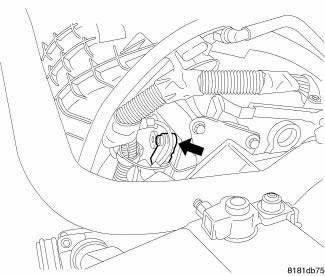
Fig. 45: Locating Knock Sensor
The knock sensor bolts into the side of the cylinder block in front of the starter under the intake manifold.
1. Disconnect and isolate negative battery cable.
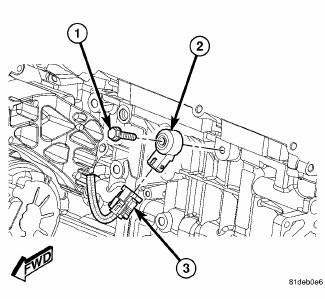
Fig. 46: 2.4L Knock Sensor
2. Disconnect electrical connector (3) from knock sensor (2).
3. Remove bolt (1) and knock sensor (2) from engine block.
2.7L
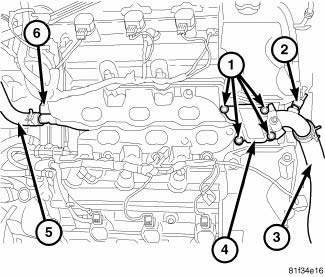
Fig. 47: Water Housing Outlet Tube 2.7L
- - Bolts
- - Coolant Temp Sensor Connector
- - Radiator Upper Hose
- - Water Housing Outlet Tube
- - Heater Hose
- - Retaining Clip
WARNING: Do not remove pressure cap with the system hot and under pressure because serious burns from coolant can occur.
1. Drain cooling system. 2. Disconnect and isolate the negative battery cable.
3. Remove lower intake manifold.
4. Remove radiator upper hose (3) at water housing outlet tube (4).
5. Remove heater hose (5) from water housing outlet tube (4) at rear of engine.
6. Disconnect water housing outlet tube (4) from retaining clip (6) at rear of engine.
7. Disconnect electrical connector (2) from coolant temperature sensor.
8. Remove 4 bolts (1) attaching water housing outlet tube (4) to cylinder heads.
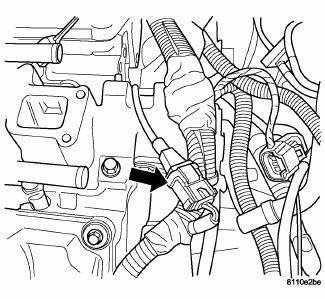
Fig. 48: Knock Sensor Connector
9. Disconnect electrical connector from knock sensor.
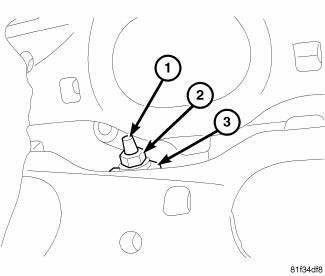
Fig. 49: Knock Sensor 2.7L
- - Stud
- - Nut
- - Knock Sensor
10. Reposition the water housing outlet tube and remove nut (2) from knock sensor mounting stud (1).
11. Remove knock sensor (3) from engine block.
3.5L
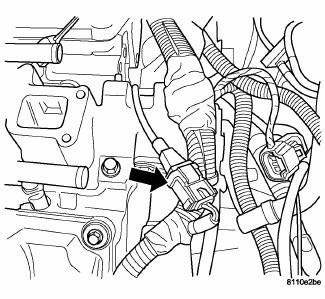
Fig. 50: Knock Sensor Connector
1. Disconnect the negative battery cable.
2. Remove the upper intake manifold.
3. Disconnect the electrical connector.
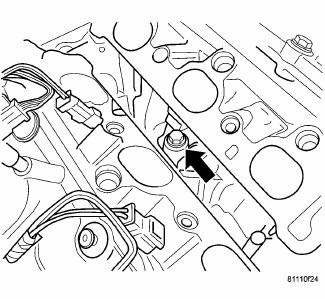
Fig. 51: Knock Sensor Location
4. Remove the knock sensor .
 Sensor, knock
Sensor, knock
...
 Installation
Installation
2.4L
Fig. 52: 2.4L Knock Sensor
CAUTION: Always torque knock sensors to the correct torque
specification. Over or
under tightening effects knock sensor performance. Ensure the electr ...
See also:
Description, Operation
DESCRIPTION
Fig. 313: Identifying Differential Assembly
- DIFFERENTIAL CASE
- RING GEAR
- TRANSFER SHAFT
- PINION GEAR
- PINION SHAFT
- SIDE GEAR
The 41TE differential is a convent ...
Diagnosis and Testing
ELECTRIC BACKLIGHT (EBL) SYSTEM
NOTE: Illumination of the defogger switch indicator lamp does not
necessarily mean
that electrical current is reaching the rear window glass and/or the outside ...
DRIVING ON SLIPPERY SURFACES
Acceleration
Rapid acceleration on snow covered, wet, or other slippery
surfaces may cause the front wheels to pull erratically
to the right or left. This phenomenon occurs when
there is a differe ...
